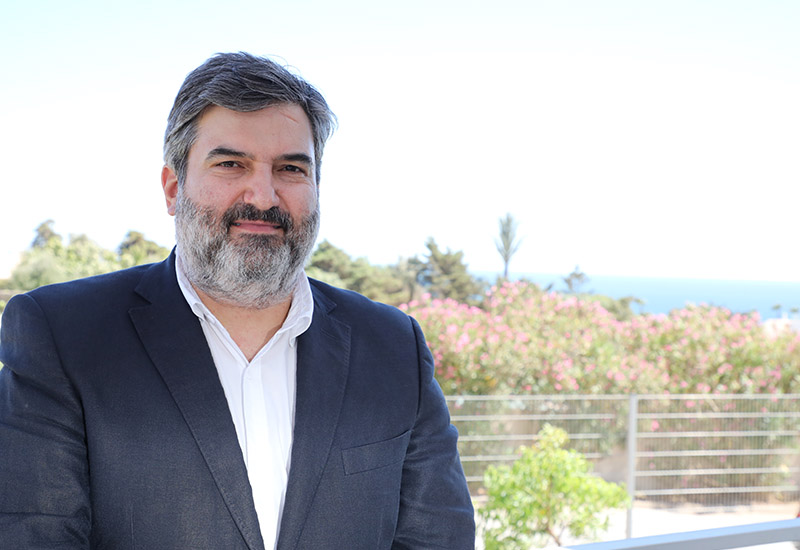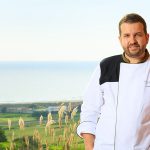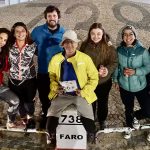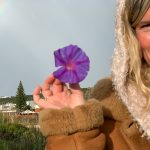The offices of Mayor Hugo Pereira are sleek and modern with a fabulous view over Lagos. Far from being sat in a gilded cage, Hugo Pereira is warm, friendly and very keen to communicate his ideas, problems and passions.
When I arrive at the Câmara Municipal de Lagos to interview the president of the municipal government, I reflect on the modern, minimalist interiors of the town’s sleek new town hall and how they represent the evolution of this ancient city into a modern cosmopolitan centre. As I ascend in the lift with the câmara’s communications assistant and Tom Henshaw (who is almost as ancient as the city!), I am slightly apprehensive about meeting Sr Hugo. I am not at all sure what to expect.
Hugo Pereira’s dedication to the city’s development is palpable. His imposing yet friendly demeanour, coupled with his youthfulness at just 48, instils a sense of reassurance about the future of Lagos. As we gather around a long wooden table, I can’t help but feel the weight of the many debates this table has witnessed.

Hugo’s commitment to sustainability is a beacon of hope for Lagos. As he navigates the challenges of mediating between different interest groups and balancing growth with environmental awareness, his dedication shines through. My first question is what his day-to-day role entails, and his response underscores his unwavering commitment to a sustainable future for Lagos.
“Many problems happen every day, but that is the challenge of this role of mayor of the municipality of Lagos: planning and trying to find many solutions on a daily basis. It is a very busy day. Most of the time, most of the things are done and solved, but often I come away with a feeling that things didn’t go so well, because it is not possible to solve all the problems at the same time. I always have the feeling that there are still things to be done.”
When the PS (socialist party) won the last election in 2019, the sitting mayor, Dr Joaquina Matos, resigned to take up a post in Lisbon. Hugo was elevated to president after serving as vice president. His background in finance – he was the chief financial officer for the hospitals of Lagos and Portimão while teaching for the Department of Health graduate studies at the University of Algarve – undoubtedly gave him a good preparation for being a civil servant. The next elections will be in September/October 2025, but no decision has yet been made about his candidacy.
One aspect that becomes evident in our conversation is Hugo’s deep-rooted love for Lagos. Despite being born in Lisbon, his upbringing and most of his life have been in the city he fondly describes as a “magical place to grow up”, acknowledging that life’s challenges may make it complex for some, but, overall, Lagos is a “very happy place to live”.
Having received many letters and concerns from our readers, I was keen to get as many of these answered as possible. The first was the confusion caused by the government’s Mais Habitaçao policy and the issuing or rather the not issuing of new AL licences.
“We were against the law regarding Mais Habitação,” he tells me. “It has prohibited new licences for apartments, but new permits for villas or houses are still possible. The municipality will be responsible for the new licences and renewal dates. We are currently drawing up a document, Carta Municipal de Habitação, defining the rules for AL licences in Lagos. We plan to determine areas where AL will not be able to exist and areas where AL will be able to exist. With this document, we will be able to identify where we need to build houses for residents where AL will not be possible (resident zones). But, tourist areas like Praia da Luz, Porta do Mós and Meia Praia will be eligible for AL licences.”
Another prevailing issue in Lagos and the whole of the Algarve is the lack of affordable housing, which affects local businesses and the social structure of the town. Tomorrow magazine interviewed Hugo back in 2019 when he first took office and he stated then that affordable housing was one of his primary objectives. So, I ask him if he feels he has made any progress. His response indicates that this is still his number-one priority and an issue he is passionate about. “We have been building since 2019, but we have noticed the discrepancy of demand versus supply. More than 1,000 households are registered for affordable housing, but only 250 are available. In 2019, we launched a local housing strategy in agreement with IHRU (Instituto de habitação e Reabilitação Urbana). The aim is to build 26,000 homes in Portugal between 2019 and 2026. In Lagos, we aim to build 250 to 300 apartments and houses.”
The mayor lists impressive progress in the bid to create affordable homes for the local population. Nine apartments in Bensafrim and eight new houses in Sargaçal are currently being allocated to low-income families. Near the câmara building, 12 apartments will be completed by the middle of this year.

But there is still a long way to go. The aim is to develop apartments for an asking price of between €180–€200,000 to ensure that those with an average income can buy a home. In front of Intermarché, 100 T1, T2 and T3 apartments and a modality of co-housing (eight apartments) are planned. It is hoped that at the beginning of June, they will open a public tender for construction. Also in planning is a new project in Bensafrim, and eight apartments on Travessa do Cemitério in Lagos are currently open for tender. The Câmara is also negotiating in Almádena to acquire land with the capacity for 20 self-construction houses. Only low-income residents can compete.
The Câmara has also acquired the old Electrolagos, near the Mercado de Santo Amaro and has created a project for 54 apartments. “In total, around 250 apartments are being planned; we are talking around 40 million in budget with community funds from the PRD,” Hugo informs me. Not happy to stop there, they are currently negotiating with a bank on purchasing land for 600 new houses and apartments, and are hoping to seal the deal imminently. Currently, all necessary formalities and procedures for this acquisition are being followed. And they are being innovative with their proposals. “We want to try several modalities. One of the options is to sell the lots on the open market with the proviso that the builders build some apartments at an affordable price.” Dreaming big, they are also looking into a large plot of land with a capacity for 1,000 apartments and resident´s services. One challenge facing them is the shortage of labour in the construction industry, which makes finding contractors difficult. However, this is an issue Hugo is passionate about. If re-elected, he cites building affordable housing as his number one goal and the legacy he aspired to.
I ask if the lack of affordable accommodation is likely to affect new hotels in the marina area when it comes to finding staff. “At the moment, we have seven or eight hotels designed for lakes, high-quality hotels with many jobs. We are asking hotels to guarantee ecological sustainability and housing for staff. The hotel must accommodate 200 or 300 rooms with 50 or 60 rooms for staff.”
Tourism presents many balls for Sr Pereira to juggle. “We have to work hard for tourism 365 days a year. We look at projects aimed at adapting to climate change to protect and preserve the coast.” He is jubilant that, the previous week, Lagos was ranked third as the most sustainable destination in terms of tourism by the 2024 Green Destinations Top 100 Story Awards at the ITB convention in Berlin (the world´s leading travel fair show).

Another of Sr Pereira’sobjectives from 2019 was to build boardwalks to encourage off-season visitors to enjoy walking the coastline while restricting erosion from uninhibited access to the cliffs. Thus, he is to be congratulated for his efforts in creating the new boardwalks along Meia Praia and Ponte Piedade. But he is not going to stop there, “We need to consider the Algarve Tourism Region as a whole as well as our city and I think we have done this. We want to connect our entire coast for safety and sustainability, and to improve conditions for users, such as with Meia Praia and Ponta da Piedade. We are currently working on a project to enhance the area around the oyster farms at Vale da Lama and to link the Alvor walkway to the Meia Praia walkway.

There is also a project to create a boardwalk from António’s restaurant in Porto do Mós, which will allow people to explore the coastal landmarks leading up to the Talefe monument then continue to Praia da Luz. To do this, they will need to acquire private land, which is currently preventing the links between different boardwalks. “We are studying the entire waterfront, hoping to connect Burgau to Vila do Bispo with a path along the coast.”
An objective for the whole of Algarve Tourism in the past ten years has been to move away from the ‘bucket and spade’ era of tourism to offer a cultural and activity-led agenda throughout the whole year. As I receive Lagos câmara’s many press releases on year-round activities, I can see how committed they are to this. “We continue to invest in large cultural projects throughout the year. We created the Doctor José Formosinho Museum and we are building the Archeology Museum. We have a project to requalify the Ponta da Bandeira Fort.”

Lagos also has an approved project to re-develop the entire city wall and provide access to the bastions. It would take around six million euros to complete. “We just need funding from the state or the European Union,” Hugo tells me enthusiastically. “We have two options, one next to the walled address known as the Green Ring, and we still need to do the third phase which is on the other side of the road, to integrate the Júdice Cabral Park with the Green Ring. We held contests for architectural studios to create a leisure and recreation area and a protection area for the wall. This would create a large urban park to delimit the wall on the outside and be a leisure site. Unfortunately, this competition did not go well, and we are now left to open a new contest for ideas from specialised companies.”

I tell Sr Pereira that many Lagos residents regret the absence of a park or leisure area in the city. He agrees. “We have an option which has already been the subject of a prior study and advanced project to create a park in the space where the fair/market is held, next to the stadium. We are designing the relocation of the market to another location to create an open-air space with a walkway along the entire Ribeira de Bensafrim that will connect to the Avenida. The idea was to be a large multigenerational health and well-being park, skate park, bicycle track, mini basketball and football pitches, exercise machines, playground and a WC area. The project is almost ready to move forward. Near the PSP, there is also a large green space that will be allocated to the municipality. We are also trying to revitalise the national forest in Barão de São João to create an interpretive centre for the forest while improving the sports area, Merendas Parque Infantil.”

One of the issues raised in our interview in 2019 was the problem of too many boats in the vicinity of Ponta da Piedade, causing pollution and disruption to sealife. The mayor regrets that since 2019, little progress has been made in this dispute. “We wanted to do more, but at the moment there are no boat licenses. A person buys a boat, just signs up on the Turismo de Portugal platform and it starts operating the next day. I am hoping that the accident in Benagil will prompt change. The port master, along with a working group, created a set of rules for the Benagil cave, for motor boats and access by other routes, paddle or kayak, to see if it starts to limit access to this sensitive environmental area. The model tested in Benagil could then be adapted to coastlines with greater pressure, such as the coast of Lagos.”
The water shortage is another issue caused by an increase in tourism, which troubles the mayor. “The water problem is severe and something the entire Algarve faces. Our area is fed by the Bravura dam and is the worst. This year, if we all made an effort (in agriculture, human consumption and companies) to reduce consumption by 15%, we won’t have a problem until the end of the year. With this year’s rains and the measures that will be taken, such as desalinisation, we hope that by 2025, the problem will begin to be resolved. Over the past two years, we have substantially reduced water consumption and water losses.”
I ask him for his view on the avocado plantations which many blame for the water shortages. He replies, “The two avocado productions do not help because they are on top of an aquifer in Almádena. The new legislation is now stricter in relation to water use, with boreholes limiting the amount of water that can be drawn and a meter controlling the amount of water consumed.”
Another reader had written to me concerned about what was happening with the diseased palm trees along the main Avenida do Descobrimentos which is harming the vista of the waterfront. “We have always had to be extremely careful with the palm trees, treating them with the best products that are available but, of course, not all private owners did the same. This plague spreads extremely quickly, and the beetle bug became resistant to the chemicals, so they are no longer working.” The municipality has been forced to cut down the diseased specimens, but the president told me that they will be replaced with a resistant palm tree or another type of tree.
He adds that the Avenida as a whole needs some rethinking: “We are studying the avenue and seeing what we can do to limit traffic, create more pedestrian areas, and provide commercial spaces for selling boat tickets and street sales, as well as more parking and mobility infrastructures.”

In light of the charity work carried out by the Tomorrow charity TACT, I ask him how the câmara helps the underprivileged in the municipality. “We have a large social support network. We provide housing, with 400 public houses. We supported the most needy families during the COVID-19 pandemic. In 2022, we provided around 6,000 food baskets. We guarantee homeless people seven days a week a hot meal a day. We support the school community, and kids do not pay or half pay for school meals, depending on the family’s economic difficulties. The same applies to sports practice. We also give school scholarships and this year, we awarded half a million in scholarship support for higher education. We have provided support for medical and hospital issues. Also, reduced tariffs for large families or those with difficult financial conditions. We also support NECI and IPSS, Santa Casa and CASLAS.”
And finally, I bravely decide to mention the C word! The people who whisper that the Lagos câmara is full of corrupt officials accepting wads of cash in brown envelopes under some metaphorical table in the higher echelons of power. He is happy to answer this concern. “It’s a word that I don’t accept in the chamber. If a complaint comes to me about corruption from anyone, the first thing that happens is to send it to the public prosecutor’s office. As president, I do everything for the greater good.”
And the greater good often keeps Hugo Perreira away from his son. He admits that he keenly feels he lacks time to be with him. “It’s not very easy. I try to compensate during the weekends.” So my final question is what does the president of Lagos do to unwind at the weekend? Well of course, he spends time enjoying all that the city of Lagos has to offer. The beach, nature walks, Ponta da Piedade, and Meia Praia, while he likes to spend time in the historic centre.
I am hugely grateful to the president for his generous allocation of time to answer all the concerns and questions of our readers. I also owe a debt of gratitude to Fábio Ventura from the Lagos Communications and Public Relations department for facilitating the interview and being an invaluable source of information for the magazine.
Whatever your political leanings or opinion on what is happening in Lagos, I came away from the interview feeling that Hugo is definitely a force for good in a challenging role that requires a great deal of mediation, patience, and commitment.
For the 2019 interview, please go to our website tomorrowalgarve.com/dec-2029-meet-the-mayor













